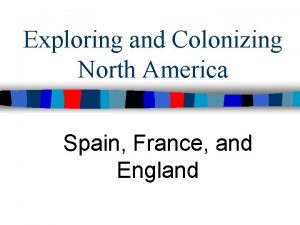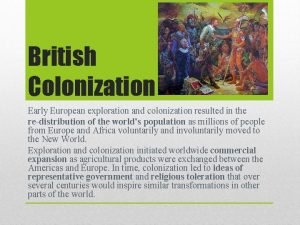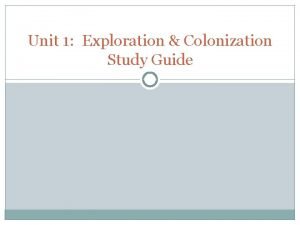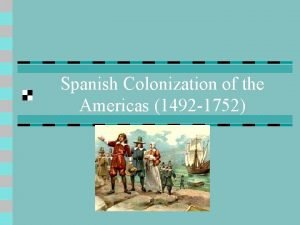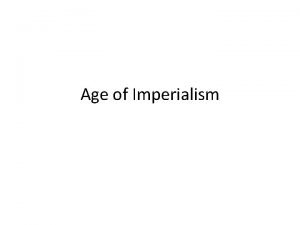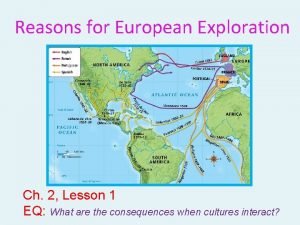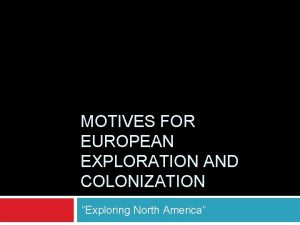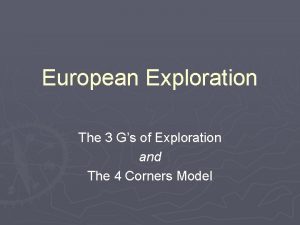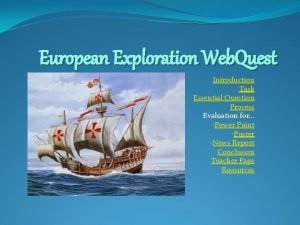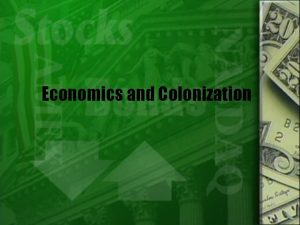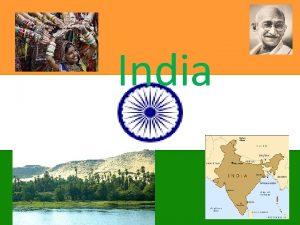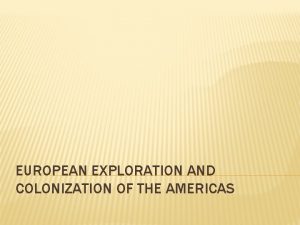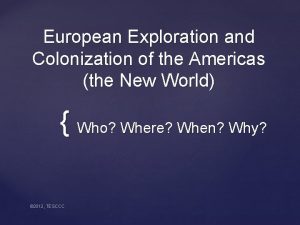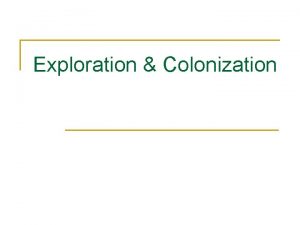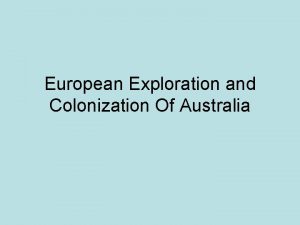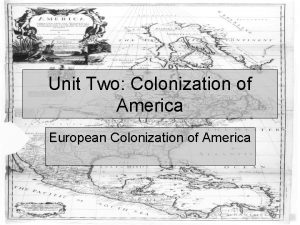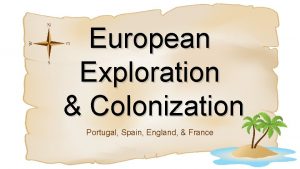Unit 1 European Exploration Colonization of the Americas











- Slides: 11

Unit 1 -European Exploration & Colonization of the Americas Spain & France

Essential Questions • 1. How did change and conflict in Europe encourage the onset of exploration and colonization of North America? 2. What motivated Europeans to take risks and relocate in America during the 16 th and 17 th Centuries? 3. What were the major characteristics of these colonies? How similar/different were they?

European Colonization of the Americas by the end of the 17 th Century

I. How did change and conflict in Europe encourage the onset of exploration and colonization of North America? A. B. C. D. E. Cultural Change Economic Change Political Change Social/Intellectual Change Technological Change

A. Cultural Change • • During the Middle Ages (700 s AD-1300 s AD) the Roman Catholic Church was the dominate religious institution in Western Europe By the early 700 s, Muslim armies had taken huge areas of Asia and North Africa, along with most of the Iberian Peninsula (Spain & Portugal) Led to the launch of the Crusades from 1096 AD-1270 AD; Christians failed to “rescue” the Holy Land around Jerusalem from Muslim control But by 1492 the combined kingdoms of Queen Isabella of Castille and King Ferdinand of Aragon drove Muslims from the peninsula; this campaign by Spanish Christians had been known as the reconquista

A. Cultural Change • Crusades had consequences for Europe: 1. They sparked an increase in trade, as crusaders returned home with a taste for products from Asia 2. Crusades weakened the power of European nobles (many had lost lives and/or fortunes in the wars); allowed monarchs to consolidate power and to sponsor exploration for even more power 3. Crusades led to decline in the power of the Pope; tipped the balance of power in favor of the monarch

A. Cultural Change • Disagreements over church authority led to the Protestant Reformation of the early 1500 s, dividing Christianity in Western Europe between Catholicism and Protestantism • This split would deepen rivalries between European nations and encouraged many to migrate to the colonies seeking religious freedom

B. Economic Change • The Crusades opened up Asian trade routes and appeased European tastes for Eastern luxuries such as silk, porcelain, tea and rugs • Merchants in Italian city-states were first to profit from trade with Asia by trading with Muslim merchants who controlled the flow of goods in the Middle East • By the end of the 1400 s Europe’s population had rebounded from plagues that had killed over 25 million • New markets were being created as commerce increased; a new middle class based on trade grew to power • Merchants excepted taxes on newfound wealth in exchange for protection or expansion of trade

C. Political Change • By the late 1400 s, four major nation-states were taking shape in western Europe: Portugal, Spain, France, and England • Crusades had weakened nobility and strengthened monarchs who found new allies in merchants • Monarchs in these countries began to collect new taxes, raise professional armies, and strengthen central government • Only the king or queen of such nations had enough power to finance overseas exploration • Motivation for exploration: money was essential to maintain status

Social/Intellectual Change • By the mid 1400 s, the Renaissance had begun in Europe • Featured renewed interest in learning and the advancement of the arts and sciences • Trade with and awareness of the world increased • This produced wealth for the nation states of Europe; which would fuel more exploration • Spread of literature through the printing press helped promote the new Renaissance ideas of individualism and experimentation

Technological Change • Johannes Gutenberg introduced the first printing press to Europe in 1440; 1477 A. D. -first printed edition of Marco Polo’s journey in China • Compass and astrolabe used by sailors to plot direction • New sailing technology, like the caravel, helped sail against the wind
 European colonization of americas
European colonization of americas Early european exploration and colonization resulted in -
Early european exploration and colonization resulted in - Unit 2: exploration and georgia colonization
Unit 2: exploration and georgia colonization Unit 1 exploration and colonization
Unit 1 exploration and colonization Spanish colonization of the americas
Spanish colonization of the americas After 1880 european colonization was motivated by the
After 1880 european colonization was motivated by the What factors encouraged european exploration?
What factors encouraged european exploration? Causes and effects of european exploration
Causes and effects of european exploration Henry hudson motives for exploration
Henry hudson motives for exploration The 3 gs of exploration
The 3 gs of exploration The three g's (gold god glory)
The three g's (gold god glory) European exploration webquest
European exploration webquest
